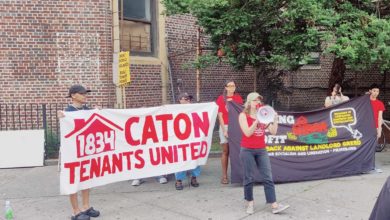More than two months after Hurricane Ida, life for the most vulnerable residents in this city remains far from normal.
On Sept. 26, at the Cancel The Rents demonstration outside New Orleans City Hall, Therese, a tenant of Carmel Spring apartment complex in New Orleans East, spoke about her landlord’s neglect of basic maintenance and safety after Hurricane Ida. Most tenants at Carmel Spring receive Section 8 housing vouchers, a government subsidy program for very low-income families and individuals.
After the storm, tenants like Therese have experienced uncontrolled bug, roach, and mold problems with no relief from their landlord. Therese explained, there are “flies all over my apartment that I can’t get rid of. … They’re telling us we have to pay our rent but it’s not fair. … They can’t expect [rent] without spraying or getting rid of the [pests] around our apartments.”
On Nov. 8, organizers from the Party for Socialism and Liberation – Central Gulf Coast spoke with residents at Carmel Spring and distributed food, water and pest control supplies.
They learned that many Carmel Spring tenants have moved out due to the unlivable conditions. Avis, a tenant whose family was in the process of loading a moving truck, explained that she realized the stress caused by her unfit living conditions was taking a toll on her health when she was diagnosed with high blood pressure.
About half of the units at Carmel Spring have doors marked with blue masking tape, indicating that they have been deemed too damaged by black mold to inhabit. Black mold causes respiratory problems and other health issues, and airborne spores also impact tenants in adjacent units.
One tenant complained that she has not been able to see two of her five children for the past two months because they are afraid to come to her home due to the bug infestation. Another spent several months in a downtown shelter after evacuating her home in Lake Charles following Hurricane Laura in August 2020. Just after she got back on her feet in Carmel Spring, Ida disrupted her life once more.
Antavius Morgan, a tenant who recently lost his job at a local restaurant after it shut down, has water damage on the ceiling of every room in his apartment, in addition to a pest infestation. He explained to Liberation News, “I’ve just been paying my rent still, but I still don’t know what the outcome will be. When I first showed [my landlord the bugs and water damage], she was saying she doesn’t think that it can be fixed, but I’m sure it can be fixed. … When she said that it didn’t make any sense to me.”
Tenant Tai Parker explained that even before the hurricane, “With maintenance, like, you put an order in and it takes days and weeks for them to come and fix something. I remember my air conditioner was out in the summertime for a whole month when I first got here. I have a 7-year old, and it was actually her air conditioner that was out.”
Louisiana law offers few protections for tenants and is intentionally vague, allowing the court system to rule in favor of landlords. For example, while the law states that a landlord’s failure to maintain an apartment in habitable condition or make repairs after a “reasonable period” of time constitutes a lease violation, a “reasonable period” is not explicitly defined.
Affluent New Orleans residents have largely recovered from Ida, but working-class poor residents remain in a state of perpetual insecurity. The corporate-controlled government refuses to adequately fund welfare or relief programs, much less take proactive steps against the oil corporations destroying Louisiana’s coastline. Climate change continues to increase the frequency of major hurricanes and further exacerbate these conditions of poverty and instability.
In the face of limited tenant’s rights, accelerating climate change, and landlord neglect, the conditions at Carmel Spring are a snapshot of the crisis facing tenants in New Orleans. Now more than ever, working-class solidarity and organization is essential. As Antavius Morgan put it, “If I were in charge, I would be doing more than what they’re doing at this point.”






